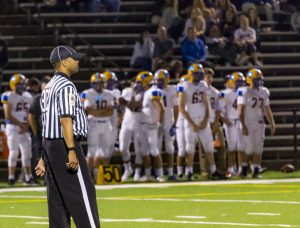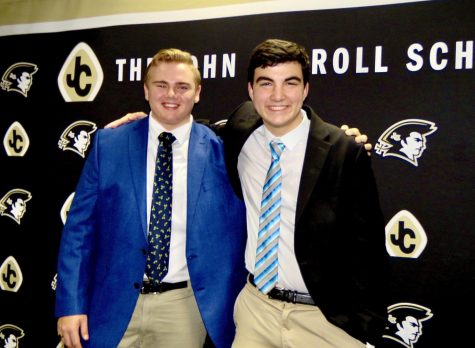Referees rely on instincts and training to make right call
December 12, 2017
The fans chant behind him. The parents yell beside him. The players and coaches focus on him. Senior Francesco Buontempo becomes the center of scrutiny every time he puts on his black-and-white striped shirt. As a soccer referee, the outcome of the game rests in his hands, and no matter what he chooses, someone won’t agree.
Players should play the game. That’s their job. Players play, coaches coach, and refs ref.
— Spanish teacher and USA field hockey referee Deirdre Magner
Many questionable calls made by referees are torn apart. Players, coaches, and fans alike often complain about refs and claim that the ref is unqualified. “Like in any sport, you have varying skill levels,” Spanish teacher and USA Field Hockey referee Deirdre Magner said. “You have some officials who have been reffing for 20 years and go to clinics and go to USA Hockey Events to make sure our ratings are up.”
Buontempo agrees that refs do have their shortcomings, they are not infallible. Refs do miss penalties and they do make the wrong calls, but they are willing to admit it. “Every ref is different, but on average, I’d say around two out of 10 calls are wrong,” Buontempo said.
However, refs must stand with their original call. It would only cause more controversy if they changed their calls. “If there’s ever any doubt in a call I make or don’t make, there’s nothing I can do about it because the game moves so fluidly. In a game, there’s no instant replay. Once a ref makes his decision, [he or she] has to stick to it, or else it looks really bad on their part,” Buontempo said.
Magner, like many refs, has had to make calls under pressure that have had large impacts on the game. “I was in Connecticut for a night game … between two undefeated teams … [There was a] one-on-one with the goalkeeper … The coaches and home team tried to tell me [the goal] was shot outside the circle. I knew what I had seen, but I wasn’t sure, and my partner couldn’t help me. She wasn’t where she was supposed to be. To this day, I don’t know if I was right. I tied the game under a controversial call,” Magner said.
Magner believes players and coaches are wasting time when they try to argue calls in games. In several sports, such as rugby, arguing a call is an ejectable offense. “Players should play the game. That’s their job. Players play, coaches coach, and refs ref,” Magner said.
Buontempo, however, does not think that the players are the main ones arguing calls. Regardless of who is arguing, Buontempo does not let it distract him from the game. “I feel as though the parents put the most pressure on you as a referee. You have to judge the game fairly, and if you call something wrong or late, it can potentially win the game for the other team,” Buontempo said.
Many focus on the validity of a refs call, while a referee’s focus is on the players’ safety, not on their bias towards a team. “It’s all about keeping the game safe. [Referees] have no particular interests. Personally, I just see two colors. It’s red and gold or white and blue,” Magner said.
In the end, referees are just trying to do their best. “Officials are not trying to make the players’ lives miserable. As much as it may seem like that. We think all the calls over in our heads. We want to make the right call,” Magner said.
Matthew Foulk is a Sports Editor for The Patriot and jcpatriot.com.






